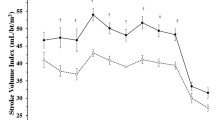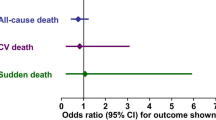Abstract.
There is substantial animal data suggesting that nitric oxide (NO) has an important role as a modulator of cardiac autonomic control with a net vagotonic and sympatholytic role. Recent human work would support this concept. This study investigated the effects of the NO donor glyceryl trinitrate (GTN) upon measures of cardiac vagal activity in heart failure. Twelve stable chronic heart failure patients were studied in a randomised double blind, placebo controlled crossover study to assess the effects of chronic treatment with transdermal GTN (10 mg per day) on heart rate variability (HRV) measures of cardiac vagal activity. No significant difference between GTN and placebo was observed in mean arterial blood pressure and most measures of HRV and baroreflex sensitivity (BRS). BRS measured by the alpha-LF index showed a small rise. In conclusion, chronic GTN administration does not produce a significant increase in HRV measures of cardiac vagal activity in patients with heart failure.
Similar content being viewed by others
Author information
Authors and Affiliations
Corresponding author
Rights and permissions
About this article
Cite this article
Buch, A.N., Chowdhary, S., Coote, J.H. et al. Effects of nitroglycerin treatment on cardiac autonomic control in heart failure. Clin Auton Res 14, 9–14 (2004). https://doi.org/10.1007/s10286-004-0143-9
Received:
Revised:
Issue Date:
DOI: https://doi.org/10.1007/s10286-004-0143-9




